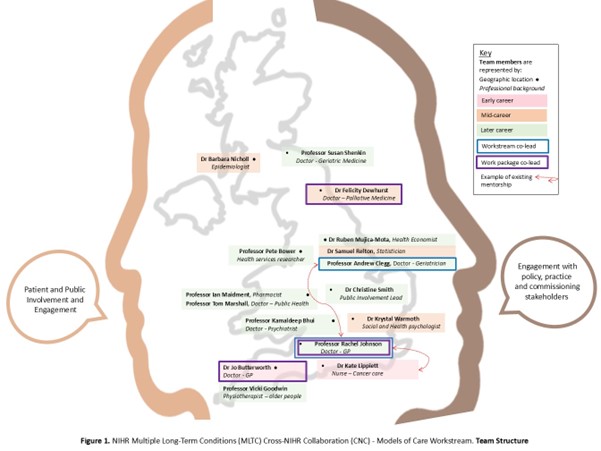Exeter Collaboration for Academic Primary Care (APEx) Blog
Exeter Collaboration for Academic Primary Care (APEx) Blog
Posted by ma403
27 November 2024On behalf of the ‘Multiple Long-Term Conditions Cross-NIHR Collaboration | NIHR – Models of Care workstream’, I have recently been granted ~£100,000 of funding from the Team Science Award | NIHR.
As a new Clinical Lecturer, I was recruited to the CNC through a competitive application and interview process at the end of 2023. I subsequently led this bid for the Models of Care workstream, one of three workstreams that make up the CNC.
The Collaboration,
‘brings together NIHR translational, applied and policy infrastructure’ to ‘build capability, capacity and leadership and address research challenges’.
We are pathfinders, as the CNC is a ‘proof of concept’ approach to tackling NIHR priorities.
The Multiple Long-Term Conditions Cross-NIHR Collaboration – Models of Care workstream
We are currently 16 members across 11 organisations.
Figure 1 gives you an idea of our geography and career stage, and how important the involvement of stakeholders is to our work, particularly patient and public involvement.
We are an inclusive, diverse, and interdisciplinary group including health and social care researchers, clinicians (doctors and allied health professionals), methodologists, community sector organisation representatives and members of the public.
We have complementary professional backgrounds, lived experience, and research expertise.
The cherry on the cake is that each team member acts as a mentor to somebody else due to the diversity of our skillset and lived experience.

The work that we have planned
Our work is very exciting and timely as it is already a national and international priority:
We are seeking a way of delivering health and care services that ensures the best possible outcomes for individuals and groups of people living with Multiple Long-Term Conditions (MLTC). We will do that by,
‘defining the principles, values, roles, and practices that guide how care and support are provided throughout the stages of MLTC’
(NIHR Strategic Framework for Multiple Long-Term Conditions).
However, we do not yet have information on research priorities relating to models of care
and so, we have planned a robust research prioritisation exercise to set out tractable research questions that can be investigated through new research.
We intend to focus on the structural elements of Models of Care for MLTC:
This focus will ensure that our findings and recommendations translate into models of care suitable for policy and practice.
The Team Science award will accelerate our goals to:
Through our inclusion of patients, the public, healthcare professionals, and policy makers we will ensure that the research priorities and work proposed will benefit the recipients.
We envisage that our research prioritisation work will support the wider academic community in their development of grants to address this important national and international priority.
Our team strengths will enable us to address the health and social care needs of people living with MLTCs in a way that would not be possible for each of us individually, or for a single site project.